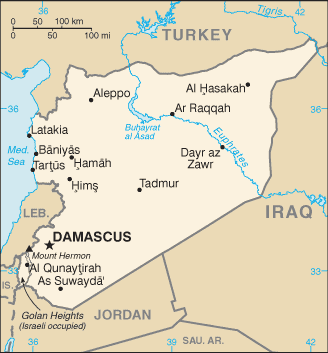Fighting has dramatically escalated over the last 48 hours in Syria’s long-contested northern city of Aleppo, with heavy airstrikes by Syrian (and reportedly Russian) warplanes and battles along the outskirts of the half of the city under the control of the Nusra Front.
 Well over 100 people have been killed in that span, with the toll rising all the time, and estimates of 200+ separate airstrikes launched into the city. UNICEF reported that the strikes had knocked out a pumping station in the Nusra-held part of the city, cutting off supplies of water to around two million people. Repairs still need to be made, but within a few hours the water began flowing again across much of the area.
Well over 100 people have been killed in that span, with the toll rising all the time, and estimates of 200+ separate airstrikes launched into the city. UNICEF reported that the strikes had knocked out a pumping station in the Nusra-held part of the city, cutting off supplies of water to around two million people. Repairs still need to be made, but within a few hours the water began flowing again across much of the area.
The European Union responded to the most recent attacks, blasting them as a “breach of international humanitarian law.” They called on Russia and other nations with significant influence to pressure Syria to end the attacks.
At the same time, unnamed Western diplomats were telling the media that they believe Russia has begun attacking the Nusra Front with thermobaric weapons. Russian TOS-1A rocket launchers were being blamed for some of the fires since the ceasefire collapse around Aleppo last week, with one claiming the rockets are “one step down from a nuclear weapon.”
Thermobaric weapons, often called “fuel-air bombs,” suck oxygen from the surrounding area to produce a high-powered blast wave. The weapons are designed for use against fortified enemies, since they can kill people through suffocation by drawing the air out of a confined space.
Syria’s military has used TOS-1 launchers a few times within the Civil War, but Russia is as yet not confirmed to have done so, or indeed to even have deployed such weapons to Syria. The use of them in a heavy populated area would, needless to say, cause massive numbers of civilian casualties.
The Syrian government doesn’t seem to have designs on just continuing the airstrikes at any rate, but rather intends to invade the Nusra-held neighborhoods outright, with forces having already captured the Palestinian refugee camp of Handarat, on the outskirts of the city, and seen advancing toward the city’s outskirts. Aleppo has been divided since 2012, and fighting over that time has done massive damage to the city.


